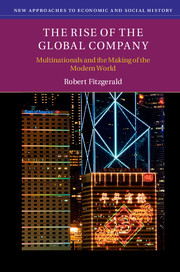Book contents
- Frontmatter
- Contents
- List of tables
- Preface and acknowledgements
- 1 Multinationals, states and the international economy
- 2 Empires of business: 1870–1914
- 3 The reverse gear?: 1914–1948
- 4 Cold War and the new international economic order: 1948–1980
- 5 Global economics?: 1980–2012
- Conclusion: International business in time
- Notes
- Bibliography
- Index
4 - Cold War and the new international economic order: 1948–1980
Published online by Cambridge University Press: 05 December 2015
- Frontmatter
- Contents
- List of tables
- Preface and acknowledgements
- 1 Multinationals, states and the international economy
- 2 Empires of business: 1870–1914
- 3 The reverse gear?: 1914–1948
- 4 Cold War and the new international economic order: 1948–1980
- 5 Global economics?: 1980–2012
- Conclusion: International business in time
- Notes
- Bibliography
- Index
Summary
Superpowers and the international system
By the end of the Second World War, having transformed its economy and then gone on to defeat Nazi Germany, the Soviet Union appeared a country of power and significant achievements. The USA had grown in industrial and armed strength, too, and it had assumed a complex mix of global influence and interests. Both democracies and autocracies had participated in the first international economy, prior to 1914, founded on a political economy of private enterprises and of markets open to investment and trade, albeit with increasing deviation from the conventional wisdom and its principles. From 1945, and by 1948, former allies had become military and diplomatic opponents. The incompatible systems of the Soviet Union and the USA represented sharp alternatives to human progress and modernity: was it the communist or the capitalist model – and ties with either of the two superpowers – that offered the greater benefits? In contrast to the nineteenth century, there was a struggle over the fused issues of ideology, international politics, and economics.
The two new superpowers pursued a Cold War of diplomatic suspicion and espionage within the critical European theatre, but elsewhere in the world the rivalry was too frequently more bloody. In 1959, boosted by the Sputnik satellite's triumphant launch, the Soviet leader, Nikita Khrushchev, told the US Vice-President, Richard Nixon, then on a trade mission to Moscow: ‘if you want capitalism you can live that way…We can still feel sorry for you.’ In reality, having already condemned Stalin's terror, Khrushchev knew that socialism in the Soviet Union had brought systematic repression, and failed to meet the material needs of its citizens. The war had placed Eastern Europe in the grip of its powerful neighbour, but this new political and military bloc was unable to match the West for cross-border commerce, investment and economic growth (Gaddis, 1998). Perceiving President John Kennedy's response to the building of the Berlin Wall as weak, Khrushchev decided, in 1962, to test the USA by placing nuclear missiles in Cuba, and provoked the most dangerous and potentially apocalyptic international crisis.
- Type
- Chapter
- Information
- The Rise of the Global CompanyMultinationals and the Making of the Modern World, pp. 258 - 414Publisher: Cambridge University PressPrint publication year: 2016

